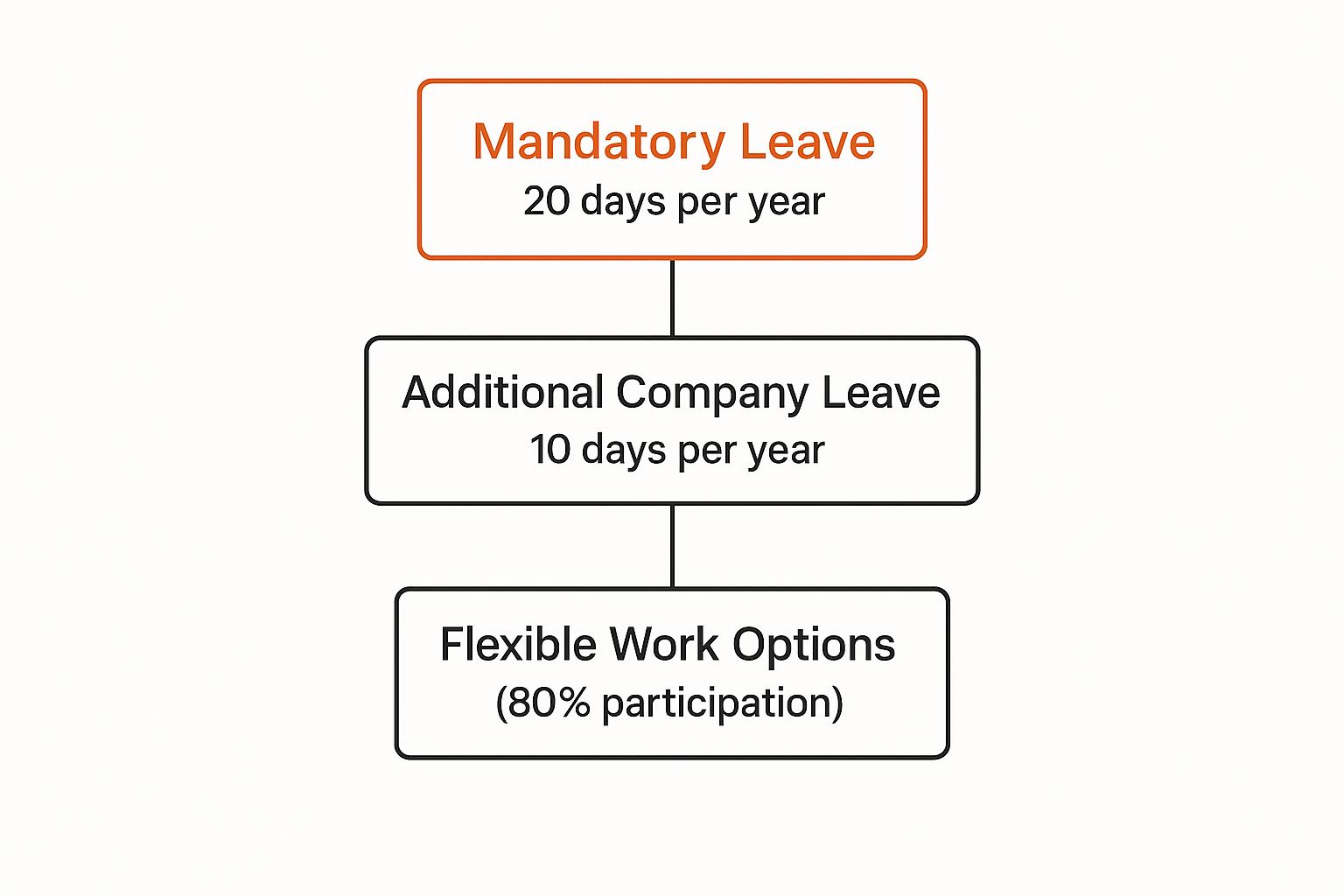Walk into a German office for the first time, and you might feel like you've stepped into a completely different professional world. What you'll quickly discover is that German work culture is built on a foundation of structure, directness, and efficiency. Getting a handle on these pillars isn't just helpful—it's essential for building a successful career and solid professional relationships here.

This guide will take you beyond the stereotypes to get to the heart of what makes the German workplace tick. From meetings to project management, a deep respect for process and clarity underpins everything. Understanding these unspoken rules from day one is your first, most important step towards fitting in and making an impact.
But don't mistake structure for rigidity. The modern German workplace is evolving. A recent study on work culture trends by Edstellar found that 64% of German companies now offer remote work options at least part-time, showing a clear move towards blending traditional efficiency with modern flexibility.
To help you navigate this environment, let's start with a quick overview of the core principles. This table breaks down the foundational concepts you'll encounter every day.
Key Pillars of German Work Culture at a Glance
| Cultural Aspect | What It Means in Practice |
|---|---|
| Direct Communication | Expect feedback to be clear, honest, and based on facts, not personal feelings. |
| Punctuality & Reliability | Being on time isn't just polite; it's a fundamental sign of respect and professionalism. |
| Planning & Organisation | Decisions are rarely spontaneous. They are methodical and backed by thorough data. |
| Separation of Work & Life | The concept of Feierabend (the end of the workday) is sacred. Private time is private time. |
Understanding these basics will help you make sense of daily interactions and expectations.
This formal, structured approach naturally extends to how professional connections are made. It's often a much more deliberate process than in other cultures. If you're looking to expand your professional circle, you can learn more about networking in Germany in our detailed article.
By really internalising these core ideas, you’ll avoid the common missteps many internationals make. More importantly, you'll be equipped with the confidence and practical knowledge to not just get by, but to truly thrive in your new role.
Straight Talk: Navigating German Communication and Feedback
If you're used to communication wrapped in soft language, the German approach can feel a bit like stepping into a cold shower. It’s direct, it's clear, and it leaves little room for ambiguity. But once you understand the "why" behind it, you'll see it not as rudeness, but as a deep-seated respect for efficiency and honesty.
In Germany, the guiding principle is Klarheit, or clarity. The goal of any conversation, especially at work, is to get to the point quickly and solve problems effectively. Think of it less as bluntness and more as precision.
A great analogy is to picture German feedback as a surgeon's scalpel. It’s designed to be incredibly precise, targeting the exact issue without causing unnecessary damage. The aim is to fix the problem, not to make you feel bad. In many other cultures, feedback is more like a spoonful of medicine hidden in a lot of sugar; the message is there, but it’s surrounded by layers of praise to soften the blow. In a German office, that's often seen as inefficient and even a bit confusing.
So, when a colleague says, "This part of your presentation isn't logical," they aren’t questioning your intelligence. They're helping you strengthen the project. Learning to see this directness as a contribution, not a criticism of you as a person, is the first and most important step.
How to Handle Giving and Receiving Feedback
The key is to separate the work from the person. It’s about being objective and focusing on the facts. This is how trust is built—by showing you're both committed to the same high standard of quality, not to protecting egos.
When you're on the receiving end of some direct feedback, take a breath and treat it like valuable data.
- Really listen. Don't just wait for your turn to speak. Focus on the specific details your colleague is sharing.
- Ask for specifics. If the feedback feels vague, get more detail. A simple, "Could you show me exactly which part of the report needs more data?" works wonders.
- Stay professional, not defensive. Your first instinct might be to explain why you did something. Resist it. Acknowledge the feedback and thank them. It shows you're a pro.
Making this mental shift is a game-changer. What once felt like an awkward confrontation becomes a chance to improve your work and build stronger, more honest relationships with your team.
Key Insight: In the German workplace, direct feedback is a form of professional respect. It means your colleague believes you're competent enough to handle the truth and use it to make the project better.
Practical Examples for Clear Communication
This preference for clarity extends to everything from meetings to emails. Vague or flowery language can be misinterpreted as being unprepared or evasive. When in doubt, be concise and get straight to the point.
Here’s what that looks like in a typical email asking for revisions.
Example Email:
Subject: Feedback on the Q3 Project Proposal
Hi Markus,
Thanks for sending the proposal over.
I’ve reviewed it, and a couple of things stand out. The data in section two is missing the revenue projections for the last two quarters; we’ll need those for a complete picture. Also, the timeline on page five looks a bit tight. I think we should talk about the deadlines for milestones three and four.
Could you please send a revised version by the end of tomorrow?
Best,
[Your Name]
Notice how it’s direct, factual, and provides a clear action and deadline. This is the kind of communication that your German colleagues will appreciate. Mastering this style shows you're efficient, reliable, and ready to get things done.
Navigating Formal Structures and Hierarchy
To succeed in a German office, you really need to get a handle on the formal structures and hierarchy. While you'll find modern start-ups with flatter organisations, many of Germany's powerhouse industries still run on a clear chain of command. Knowing these unwritten rules isn't just about being polite; it's fundamental to working well with your colleagues and making a good impression.
One of the first things you'll notice is the formality in how people address each other. This is most obvious with titles and the use of the formal "you," or Sie. Unlike in English, where "you" is universal, German has two forms: the formal Sie and the informal du. The professional standard is to use Sie with anyone senior to you, managers, and new business contacts. It’s a sign of respect for their position and experience. The switch to the more casual du almost always comes at the invitation of the senior person. Don't rush it.
This formality isn't about being stuffy. It's rooted in a deep cultural value for Ordnung (order). A clear hierarchy isn’t a power play; it’s about making sure everyone knows their role, what they’re responsible for, and how decisions get made. This structure cuts down on confusion and makes everything more efficient. Think of it like a well-organised library—every book has a specific place, so you can find exactly what you need without chaos.

Respecting the Chain of Command
So, what does this look like day-to-day? It means you follow the established channels for communication. If you have a brilliant idea or a serious concern, your first stop is your direct supervisor. Going over their head to their manager is generally seen as a major misstep and a breach of trust.
Pro Tip: When you do bring forward a new idea, don't just show up with a concept. Come prepared. You'll need a thought-out plan, some data to back it up, and a clear outline of what you expect the results to be. This approach directly appeals to the German preference for decisions based on facts and proves you've done your homework.
Sticking to these norms shows you're not just a tourist in their work culture; you understand it and respect it. It’s how you build trust and prove you're a reliable professional who can work effectively within the system.
Modern Shifts in German Hierarchy
Of course, it’s worth remembering that things are changing. This traditional model isn't universal anymore. In the tech scene and international start-ups, especially in hubs like Berlin, the atmosphere is often far more relaxed. In those companies, you might find everyone uses first names and the informal du from the get-go, no matter their job title.
The best strategy is to simply be observant for the first few days and weeks.
- Listen carefully. How are your colleagues talking to each other and to their bosses?
- Check email signatures. Are people using formal titles like Dr. or Dipl.-Ing.?
- Follow your team's lead. If you’re ever unsure, the safest bet is always to start with Sie and a last name. It’s much easier to dial back from being too formal than to recover from being too casual.
Figuring out these details is a key part of settling in professionally. To get a better sense of the philosophy behind German business, you can learn more about our mission to bridge the gap for internationals. This kind of insight will help you navigate not just the hierarchy, but the entire corporate environment.
The Evolving German Work Ethic and Pflichtbewusstsein

If you want to understand the traditional german work culture, you have to start with one powerful concept: Pflichtbewusstsein. There’s no perfect English equivalent, but it translates to a deep, personal sense of duty and responsibility. This is the invisible engine driving the punctuality, reliability, and intense focus on quality that Germany is famous for.
Think of it as an internal compass for professional conduct. Someone with strong Pflichtbewusstsein doesn't just do their job because they were told to. They feel a personal obligation to deliver excellent results, almost as a matter of principle. This is precisely why deadlines are treated as firm commitments and why getting it right is always more important than getting it done quickly.
Understanding the Traditional Work Ethic
This deep-seated sense of duty is the bedrock of German workplace expectations. It directly shapes how colleagues view their own responsibilities and hold others accountable, fostering an environment where professionalism and reliability are the baseline, not the exception.
This traditional ethic rests on a few key pillars:
- Precision: Work isn’t just done; it's meticulously planned and executed with an almost surgical attention to detail.
- Discipline: Sticking to established processes and maintaining unwavering focus during working hours is non-negotiable.
- Reliability: When you commit to a task, your team trusts it will be completed on time and to standard, without the need for constant reminders.
It’s this very mindset that has given German engineering its world-renowned reputation for quality. The same exacting standards are applied to everyday office tasks.
Key Insight: Pflichtbewusstsein isn't just a work ethic; it's a cultural value. Doing your job well is directly linked to your personal integrity and the professional respect you command.
But the story doesn't stop there. The professional landscape in Germany is shifting, with new attitudes and expectations challenging these long-held traditions, especially among younger generations.
The Modern Evolution of German Work Values
While that foundation of duty is still present, the way it's expressed is changing. Recent analysis reveals a clear shift in workplace priorities, including a lower tolerance for risk and a greater desire for job security over pure performance metrics. This evolution is reshaping expectations around productivity, a trend you can explore further to understand the shifting German work ethic on kummuni.com.
What this means is that today’s German workplace is a fascinating blend of the old and the new. Younger employees, in particular, are looking for more than just a paycheque; they want to find genuine meaning in their roles and achieve a sustainable work-life balance. They still value quality and efficiency, but they also expect their employers to provide personal fulfilment and respect their time outside the office.
For any international professional, grasping this duality is crucial for success. You need to appreciate the traditional foundations of duty and quality while also adapting to the modern drive for flexibility and purpose. Navigating the german work culture today is all about finding your place between these two powerful forces.
Achieving True Work-Life Balance the German Way
If there's one aspect of German work culture that people everywhere admire, it’s the genuine commitment to a healthy work-life balance. This isn't just a trendy HR buzzword; it’s a core value baked into the national psyche, and it’s perfectly summed up by one of my favourite German words: Feierabend.
Feierabend doesn't just mean "quitting time". It signifies a hard stop—a respected, almost sacred boundary between your professional responsibilities and your personal life.
When the workday ends, it really ends. Laptops snap shut. Emails go unanswered until tomorrow. The focus shifts completely to family, hobbies, or simply relaxing. This cultural expectation to fully disconnect is a powerful antidote to the "always-on" mentality that leads to so much burnout elsewhere. It’s not about working less, but about working smarter and more intensely during your contracted hours, then properly switching off.
Embracing the Feierabend Mindset
Getting used to this can be a real adjustment, especially if you come from a culture where you're always connected. The trick is to start seeing your personal time not as a bonus, but as a critical part of your professional toolkit. After all, a well-rested mind is a productive mind.
In Germany, protecting your evening isn't seen as a lack of ambition. On the contrary, it’s viewed as a sign of excellent time management and a commitment to long-term well-being and peak performance.
This mindset isn’t just a social agreement; it's backed by the law. Germany has some of the strictest regulations in Europe on working hours. On top of that, there's a legally mandated minimum of 20 paid vacation days per year, though in reality, most full-time employees get closer to 30. This provides a rock-solid framework that encourages everyone to recharge.
The Link Between Well-Being and Productivity
More and more, German companies are realising that employee well-being isn't just a "nice-to-have"—it's a direct driver of business success. The German model proves that you don't have to sacrifice your personal life to achieve professional excellence.
The data backs this up. The European Workforce Study 2025, for example, draws a clear line between factors like work-life balance and a company's productivity. It suggests that businesses that genuinely prioritise these things can see significant performance gains—a principle many German firms are already living by. You can discover more about these workforce satisfaction findings in the full report.
By respecting boundaries and valuing rest, the German work culture offers a powerful blueprint for building a successful and, more importantly, a sustainable career.
Common Questions About Working in Germany

Stepping into a new professional world always kicks up a few questions, and Germany's unique mix of tradition and modern efficiency is no different. Think of this section as your go-to FAQ, where we'll tackle the most common queries head-on.
These are the quick, practical insights you'll need to handle everyday situations with confidence. From showing up on time to after-work drinks, we'll cover the essentials for making a great impression from your very first day.
How Important Is Punctuality in German Business?
It’s everything. In a German office, punctuality isn’t just about being on time; it's a non-negotiable sign of respect, reliability, and good planning. Being precisely on time for any professional meeting is the absolute minimum expectation.
Showing up even five minutes late without a quick heads-up can be seen as disorganised and unprofessional. This high standard isn't just for meetings—it applies to project deadlines, too. It’s a direct reflection of the immense value placed on Ordnung (order).
To build a solid reputation, always plan to arrive exactly on time or even a few minutes early. It's a simple habit that speaks volumes about your professionalism before you even say a word.
Is It Common to Socialise with Colleagues After Work?
Generally, no. Spontaneous after-work socialising is much less common than in many other cultures. Germans hold a very clear, respected boundary between professional life and private life (Privatleben).
While colleagues are almost always friendly and professional at the office, don't expect impromptu trips to the pub once the clock hits five. Social gatherings like team dinners or the annual Christmas party are nearly always planned far in advance, giving everyone plenty of notice.
It's crucial not to mistake this professional boundary for unfriendliness. It's simply a cultural emphasis on protecting personal time, which is considered essential for well-being and long-term productivity.
Friendships definitely form at work, but they tend to grow more slowly and naturally over time. Patience is the key here.
What Is the Dress Code in a German Office?
The dress code really depends on the industry, but the general rule is to lean towards conservative and functional. Looking neat, professional, and put-together is always the main goal.
- Traditional Sectors: In fields like banking, finance, insurance, and law, formal business attire is the norm. This means suits and ties for men and business suits or smart dresses for women.
- Corporate Offices: Most other corporate settings follow a business casual code. Think smart trousers or skirts, blouses, collared shirts, and blazers.
- Tech and Start-ups: The tech scene, especially in hubs like Berlin, is far more relaxed. Here, you'll find that clean trainers, jeans, and t-shirts are often perfectly fine.
If you're ever in doubt, it's always safer to be slightly overdressed for your first few days. See what your managers and teammates are wearing and then adjust to match the environment.
How Are Decisions Made in German Companies?
The decision-making process here is typically methodical, data-driven, and aims for consensus, though the final call always rests with the hierarchy. Decisions are almost never made on the fly in a meeting.
Instead, expect a deep dive into the facts, figures, and potential risks before anyone commits. If you're presenting a proposal, you'll be far more convincing with detailed evidence and a well-reasoned plan. In Germany, logic and data will always win over an emotional appeal.
Once a decision is finally made through this careful process, it’s considered final. The team is then expected to get behind it and implement it efficiently, without reopening the debate.
What Is the First Step to Working in Germany?
Before you can get into the details of office life, your first and most critical step is to secure the legal right to work here. This means navigating some specific bureaucratic hurdles that depend on your nationality.
For most non-EU citizens, getting the right visa is a mandatory first step. The type you'll need can vary, from the EU Blue Card for highly skilled professionals to other work-specific permits. To get started, you can find a detailed breakdown in our comprehensive guide to German work visa requirements. Sorting out this paperwork first lets you focus completely on starting your career in Germany.
Ready to confidently navigate Germany’s competitive job market and cultural landscape? At iknowly, we connect you with top German professionals for instant 1:1 consultations to help you with CV enhancements, interview prep, and strategic career planning. Get personalised guidance from verified consultants at leading companies. Book your first session on iknowly.com.

Leave a Reply